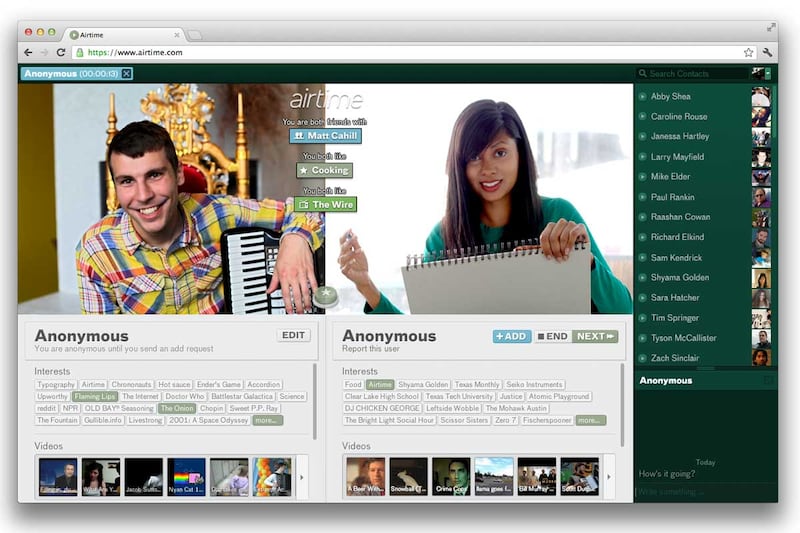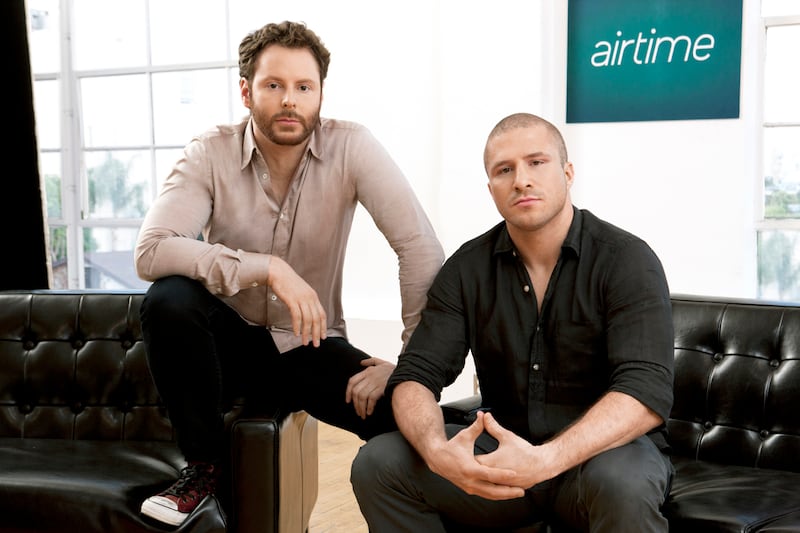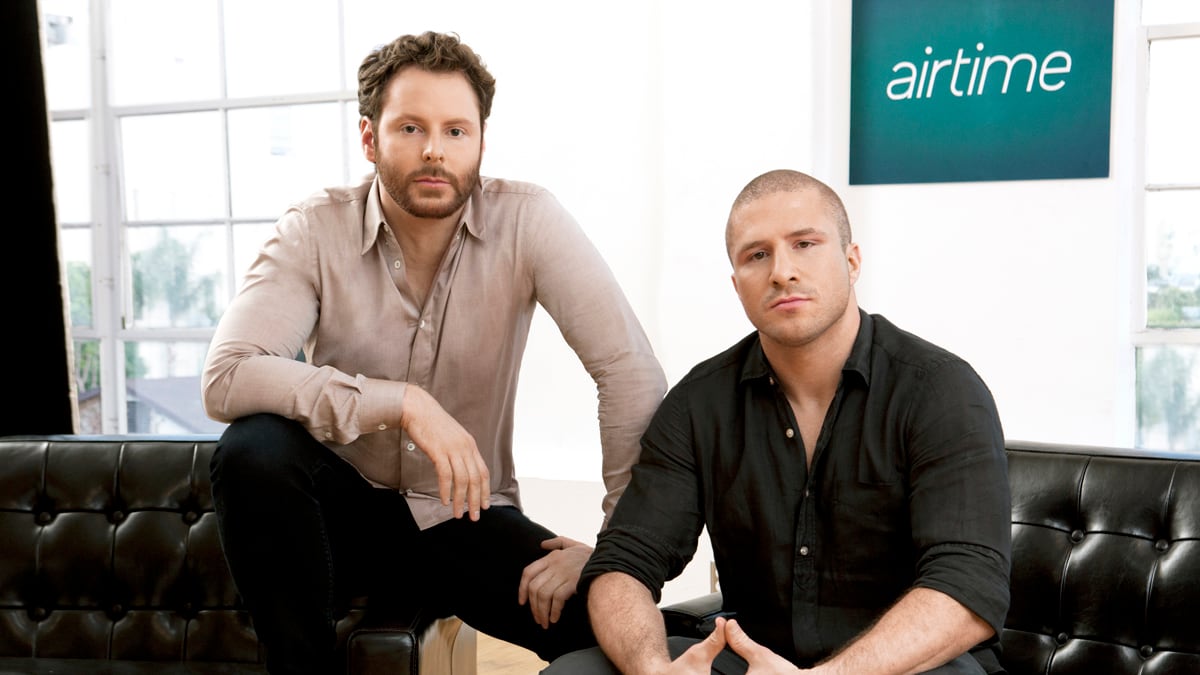“They are the Jean-Claude Van Damme and Dolph Lundgren of the Internet!” proclaimed Jimmy Fallon.
The late-night-television host was introducing Sean Parker and Shawn Fanning at a star-studded event at Milk Studios in Manhattan’s trendy Chelsea neighborhood to introduce their latest venture, Airtime. The two are cofounders of the revolutionary peer-to-peer file-sharing program Napster, which forever changed the music industry. Parker also helped expand Facebook’s reach as the company’s former president—he was infamously portrayed by Justin Timberlake in The Social Network—and is still worth roughly $2.2 billion, despite Facebook’s plummeting stock price.
Airtime is a peer-to-peer video-chatting network (think: a classier Chatroulette) that’s fully integrated into Facebook chat. The network allows strangers to forge new friendships by video chatting with each other and sharing mutual interests (think: Google Plus).
ADVERTISEMENT
“I can’t help but feel like with some of these services, we spend more time processing information than interacting with real people,” said Parker. “Facebook and Twitter aren’t truly real time. LIVE is the only real time.”
In a demo presentation, the two had stars like Jim Carrey, Olivia Munn, Joel McHale, Ed Helms, and Julia Louis-Dreyfus chat on Airtime with each other, before bringing them out onstage. Snoop Dogg and Alicia Keys also joined in on the fun, via remote locations. Oh, and Martha Stewart was sitting front row in the crowd.
Parker and Fanning took some time after their glitzy soiree to chat with The Daily Beast about what Airtime brings to the table, Facebook’s IPO disaster and its future, what they think of Pinterest and its $1.5 billion valuation, and other areas they’d like to see “disrupted.”

You said during the presentation, “Facebook doesn’t build new relationships, it’s just trying to be the most accurate model possible of your real-life social graph.” So how does Airtime help achieve what Facebook can’t in fostering new relationships?
Shawn Fanning: We are first taking advantage of the fact that there’s technology that allows you to do peer-to-peer video where you’re actually able to see the person interact in such a way that you’ll get to know them. Sean and I got to know each other in a chatroom, but it took a lot of time to build that relationship, so our idea was to have people have a conversation facilitated by a host, Airtime. So rather than approaching someone and having all sorts of awkward interaction and taking a risk, you get to utilize Facebook integration to find a common ground and find things to talk about.
Sean Parker: It’s actually amazing that no one’s done anything with the interest graph. It’s only been used for targeted ads, and applications haven’t leveraged that in an interesting way. Fanning likes to talk a lot about the service being a host, and a lot of our engineering effort went into the “matcher algorithm”—basically our matching service that’s able to look at all sorts of things like conversation length, how quickly you get “nexted,” explicit feedback. You add that on top of the interests graph and all the videos people are watching, and you get a very nuanced view of people.
People are calling Airtime a combination of Chatroulette, as far as the video-chatting element is concerned, and Google Plus, since you share interests with each other.
Parker: We try to avoid obvious comparisons in general. No one’s ever built a product leveraging Facebook’s graph that allows you to share stored video experiences with your friends. It’s just never been done.

How do you stop the crazy masturbators that invaded Chatroulette?
Parker: When it’s connected to your profile and Facebook account, I think that changes the dynamic completely. But we also have a very high-functioning abuse-prevention system that’s flagging this stuff.
Fanning: We have face-detection called OpenCV.
How do you think Airtime will affect dating? It seems like it could serve as an updated version of video dating.
Fanning: The reality of the Internet is, as far as people meeting new people, the only time this ever happens is in dating sites where there’s an overt agenda, or online gaming where you can have shared experiences, but they’re all virtual with assumed identities.
Parker: It’s way more real. You know how someone really looks and acts. Whether it’s making a new friend or some kind of romantic thing, there’s so much more depth to it and you can actually evaluate. The whole rub with online dating is people just make up fake profiles with fake pictures. You can use our service in a fantastical way and be creative and weird and some other version of yourself, but it’s still a high-bandwidth relationship. You can’t really hide who you are.
How does Airtime work in concert with Facebook?
Parker: If on Airtime I send you a chat request, then the person on Facebook gets a pop-up, and if they click, now we’re both chatting. It’s a pretty seamless and deep integration.
What are your thoughts on Facebook and its plummeting stock price? The founder of Ironfire Capital even came out Tuesday and claimed Facebook would “disappear” in less than a decade.
Parker: It doesn’t really matter. If you’ve been holding Facebook stock for this long, and you believe in the long vision of the company—that identity is central to everything we do in the real world and online, and that those two worlds have actually converged—then you basically recognize that there’s a huge number of businesses that are dependent on this identity layer, which includes your authentication, reputation, trust, social graph, and how information moves through that graph. There are all these businesses that are adjacent businesses to Facebook’s core ad business that they haven’t even scratched the surface of.
Fanning: For Facebook, branching outside of the core interaction of staying in touch with your friends and managing that network, the platform has fostered all kinds of innovation.
Parker: Zynga has been a huge win for Facebook. All the non-core applications—ones that aren’t a core part of the product—there will be other winners among those applications. I think that the tax-and-toll strategy—creating a platform, helping to facilitate in the success of your platform partners, and then levying a tax for interfacing with your user base, and ultimately a tax on your success—is actually a pretty good scalable model that leads to a bunch of different markets.
What are your thoughts on Pinterest? Many found its recent $1.5 billion valuation to be pretty bloated.
Parker: It all seems a little frothy and a little crazy. The problem with a lot of these applications, whether it’s Pinterest or Social PM, is they’re so dependent on Facebook’s open graph, so it’s all just these viral loops, and these things can skyrocket and then collapse, and it just depends on the tuning. It’s one thing to be leveraging off Facebook or building an adjunct to Facebook, and it’s another to be dependent on Facebook.
Fanning: If you watch the way that content spreads from user to user on Airtime, it’s taking advantage of those connections and allowing them to grow and evolve. It’s giving the sense that we’re making that experience better for people over time. We think the need to extend your network and meet new people is a core need that all people share.
What do you think about working in concert with Apple? The company has experienced such a meteoric rise in the last decade.
Fanning: Does it matter that Sean blamed them for most of our problems today?
Parker: I jokingly blamed every technology company I could think of! But no, it would be awesome. I think we need to prove our product to the market first.
You two are both famed “disruptors” for shaking up the music industry with Napster. What other areas do you feel could use a little shaking up?
Parker: Politics is interesting because it hasn’t really been disrupted. I think marketplaces are really interesting. Nobody’s really done anything with eBay or Craigslist. There’s these markets that are really archaic, and there isn’t even a reliable sense of identity on these systems.
Fanning: I’m interested in disruption as it relates to nutrition and health. People really bombard themselves with stuff and we don’t do a lot to manage our biochemistry. You spend a lot of life trying to figure out how not to suffer, and I think there’s a lot we can do with technology in that area that hasn’t really been explored.




